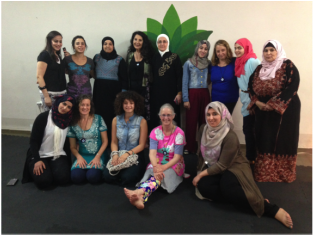 This is the third installment about my trip to the Middle East in May, 2015 We’ve been with the women in our classes for three days now. They are all Muslims except for one of our interpreters from Bethlehem who is Christian. The 13 Arab women would arrive each day fully covered in their Hijab, which includes two head coverings and an outer robe. Rob and Alice, who had supplied this Yoga center with blankets, blocks, straps and sticky mats came to the center each morning before we began teaching. The women would stay in their traditional coverings until Rob or any other man would leave. In their culture the only men who could see them without their headdress and robes were their husbands, brothers and sons. As one woman explained…even their cousins could not see them without their full dress. If a man entered the yoga room to deliver food or make repairs, they would either hide in a back room or put on their full dress. Under their Hijab, the women wore tight Yoga pants and long T-shirts. Some had glitters and one woman had a child’s T-shirt that had balloons as faces in bright colors of pink, lime green and yellow. I admired it and the next day she brought me a shirt just like it! I had forgotten. When you admire someone’s possession in that part of the world, it is an unspoken part of the culture to give it to you. I was raised in the Lebanese culture of my father and routinely gave away anything someone admired. Years ago, my English husband had to remind me that in America, this unspoken custom did not apply. When people admired things in our home such as oriental rugs, paintings and chairs, I did not need to give them away! The first of four days of class, the women were a bit reserved. They did not know us, or what were going to do. Most were Yoga teachers who taught in Nablus, Ramallah, and some in the refugee camps in Bethlehem. These teachers work with students who have every health issue imaginable. These areas are some of most acutely stressful in the world. The people never know when an attack from the military would happen, or when a bomb at the front door might explode in the middle of the night causing soldiers to storm the home, forcing men, women and children out into the streets. At times, several sources said that the boys as young as 13 or 14 would be taken to prison where some would be held for four or five years without trial, legal assistance, or communication with their families. One of the members of our group said her son was coming home after 15 years of imprisonment, without trial or being allowed to see or speak with any lawyer or family member. I sighed in futility and with hesitation, asked our translator about the torture methods once used by the military. She replied with sadness, “It is still going on but not as much, because the human-rights organizations have become more active and visible.” I held the sorrow in my heart that defied time. More than two decades ago, my minister husband and I witnessed human-rights transgressions by those who suffered so much before and during World War II. When we tried to speak of this to the Jewish community in the U.S. 20 years ago, thinking they would want to do something to stop it, they closed ranks to discredit the messengers, branding us as “anti-Semitic.” To even question the suffering inflicted on others was considered heretical. If a person was Jewish who questioned the actions of Israel, they were considered to be “self-hating Jews.” In the mid-1990s, I worked with the Israeli Yoga Teachers Association to hold a conference in Jerusalem, the theme of which was “Peace in the Middle East.” The Arabs were not allowed beyond the “checkpoints” and could not attend. However, it was a wonderful conference that brought forth contemporary masters of Yoga from around the world. The Israelis loved it. Indra Devi, Sri T.K.V. Desikacharya, Amrit Desai, Swami Dayananda and other leading Yogis from India and throughout the world were there. After the conference we took a smaller group into the West Bank to spread the message of Yoga to the Arabs who were not allowed to attend the conference. Now, two decades later, the young aspiring Yoga teachers in the West Bank are still not allowed to travel outside the region. Our visit was a time to create balance by focusing on teaching for Palestinians. I gazed with admiration at this group of beautiful women, social workers, psychosocial workers, teachers of children, hospital workers and clinicians, all intent on making lives better for themselves and others. They spoke the five little words that I have heard for 48 years of teaching, “Yoga has changed my life.” Through Yoga, they have found ways to feel free, even with the immense restrictions imposed upon them and their families in the midst of the occupation. Yoga transcends boundaries within us to give a sense of physical, mental, emotional and spiritual expansion in all areas of our life. What a perfect practice for this area of the world. I continued to say, “If we can’t have peace around us…Yoga helps us find the peace within us.” The women seemed grateful to be learning and being in an unfettered environment of communion with one another. In just three days, they have weaved their way into my heart where they will be held long after this trip is over. It was an unusually hot day and now the evening sky is angry with clashing thunder, lightening, the threat of rain and yet … no rain. Now it is time for sleep.
0 Comments
Leave a Reply. |
Archives
August 2020
Categories |
Live Chat Support
×
Connecting

You:
::content::
::agent_name::
::content::
::content::
::content::
 RSS Feed
RSS Feed